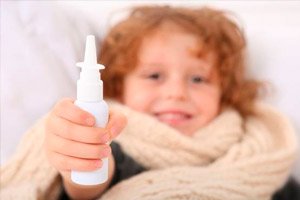
All iLive content is medically reviewed or fact checked to ensure as much factual accuracy as possible.
We have strict sourcing guidelines and only link to reputable media sites, academic research institutions and, whenever possible, medically peer reviewed studies. Note that the numbers in parentheses ([1], [2], etc.) are clickable links to these studies.
If you feel that any of our content is inaccurate, out-of-date, or otherwise questionable, please select it and press Ctrl + Enter.
Hypertonic solution speeds recovery from colds
Last reviewed: 02.07.2025
 ">
">A new study presented at the European Respiratory Congress (ERS) in Vienna, Austria, found that using hypertonic saline nasal drops can shorten the duration of a cold in children by two days. The study also found that saline drops can reduce the likelihood of passing on a cold to other family members.
According to Professor Steve Cunningham from the University of Edinburgh in the UK, children experience up to 10-12 upper respiratory infections a year, which has a significant impact on their health and that of their families. Although there are medications to ease symptoms, such as paracetamol and ibuprofen, there is no treatment that can speed up recovery from a cold.
The ELVIS-Kids project's principal investigator, Dr Sandeep Ramalingam, a consultant virologist at NHS Lothian, Edinburgh, noted that saline solutions are often used in South Asia to treat colds. He wanted to see if a similar clinical effect could be achieved in a larger trial.
The study included 407 children aged 6 years or younger who, when they developed a cold, were given either hypertonic saline (~2.6%) or usual cold care. A total of 301 children developed a cold; parents of 150 of these children were given sea salt and taught how to prepare and use saline nasal drops (three drops in each nostril, at least four times daily until recovery). The remaining 151 children were given usual cold care.
The study found that children who used saline drops had an average of two fewer days of cold symptoms (six days versus eight) compared to usual care. Children who received saline drops also needed less medication while they were sick.
Salt is made up of sodium and chloride. Chloride helps the cells lining the nose and airways produce hypochlorite acid, which inhibits viral replication. This shortens the duration of a viral infection and shortens cold symptoms.
In addition, families where children received saline drops had fewer other family members getting sick (46% versus 61% with usual care). More than 80% of parents reported that the drops helped their children recover faster and said they would use them in the future.
Professor Alexander Möller from the University Children's Hospital Zurich said this was the first major study to examine the effects of saline drops on colds in children. He stressed that this inexpensive and simple procedure could have global applications, reducing the economic burden of colds on the health of children and their families.
The research team plans to continue studying the effects of saline drops on wheezing in children, as preliminary results showed that children who received the drops were less likely to experience wheezing episodes (5% versus 19%).
